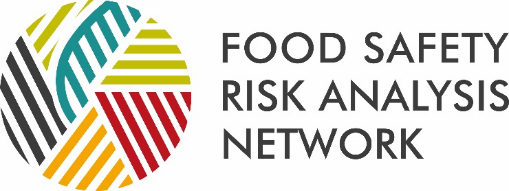Food Safety Risk Analysis Network | Español

Mission
Objectives
Members
Activities
Description of CTI and key dates of activities involving partners
Mission to create an international network of universities (U. of Minnesota, U. of Nebraska, Texas Tech, U. of Maryland, U. of Laval in Canada and Universidad para la Cooperación Internacional in Costa Rica), and international organizations (PAHO, FAO, IICA and OIRSA). to transfer knowledge and experiences in risk analysis to food safety stakeholders in Latin American and Caribbean to enable governments to use science-based approaches to protect public health and promote the safe trade to attain sustainable food systems.
Objectives are to harmonize, develop, train, and implement food safety risk analysis in Latin America and the Caribbean region (LAC).
The main objectives of the FSRisk are:
- Build trust, strengthen communication and share resources among all the organizations that work in the region
- Promote the application of food safety risk analysis tools to enhance the food safety management systems in countries in the Americas in particular, Latin America and Caribbean countries
Members:
International Organizations:
- FAO (Marisa Caipo)
- PAHO (Margarita Corrales)
- IICA (Ana Marisa Cordero)
- OIRSA (Nancy Villegas)
- GAIN (Elisabetta Lambertini)
- CVP (Gabriella Campón)
Academic institutions
- University of Minnesota (Fernando Sampedro)
- University of Nebraska (Bing Wang)
- Texas Tech University (Marcos Sánchez)
- University of Maryland (Clare Narrod)
- University of Laval (Samuel Godefroy)
- Universidad para la Cooperación Internacional (Félix Cañet)
Government agencies
- Dirección General para la Inocuidad Alimentaria, Uruguay (Norman Bennett)
- ACHIPIA, Chile (Constanza Vergara and Gustavo Sotomayor)
- SENACSA, Paraguay (Jessica Duarte)
- SDA/MAPA, Brazil (Claudia Valeria Goncalves)
Events/Key dates:
- Sept 3-4, 2015-Strategic planning meeting to develop/coordinate food safety risk analysis training for Latin America (LATAM region at IICA headquarters, Coronado, Costa Rica·
- 2016 FS Risk Network established
- July 2016-Official presentation of the food safety risk analysis capacity building strategy at the COPAIA meeting (7th Meeting of the Pan-American Commission on Food Safety) and approval by all the Ministers of Health and Agriculture at the RIMSA meeting (17ª Reunión Interamericana Ministerial de Salud Y Agricultura) in Asunción (Paraguay).
- A paper was written by founding members of the consortium: F. Sampedro, C. Narrod, M. Sánchez-Plata, R. Flores, B. Wang, A. Cordero, H. Friaça Silva, M. Caipo, E. Perez. 2016. Building a strategic alliance for sustainable food safety risk analysis capacity building in the Americas.
- Sept 27-30, 2016-Presentation of the new food safety risk analysis capacity building strategy for LATAM at COLMIC (Congreso Latinoamericano de Microbiología e Higiene de Alimentos) to government participants from Colombia, Argentina, Chile and Uruguay in Medellin (Colombia)
- August 3-4, 2017-Food Safety Risk Analysis capacity building strategy for Latin America meeting at JIFSAN, University of Maryland, College Park, Maryland.
- November 2017-Development of a microbial risk assessment manual for governments in Latin America led by PAHO May 2018: Official launch of the FSRisk network with the participation of University of Minnesota, University of Nebraska, the Joint Institute for Food Safety and Applied Nutrition, University of Maryland (JIFSAN), Universidad para la Cooperación Internacional (Costa Rica), Texas Tech University, the Inter-American Institute for Cooperation on Agriculture (IICA), Organismo Internacional Regional de Sanidad Agropecuaria (OIRSA), Pan-American Foot-and-Mouth Disease Center (PANAFTOSAPAHO/WHO)and the Food and Agriculture Organization of the United Nations (FAO).
- July 2018-Roundtable session “Building a Strategic Alliance for Sustainable Food Safety Risk Analysis Capacity Building in the Americas” to present the FSRisk consortium at IAFP symposium in Salt Lake City, Utah (USA).
- September 2018: Virtual meeting with LATAM government officials to share the FSRisk network mission and goals with the participation of 50 participants from 13 countries
- September 2018- USDA FAS award to modernize the risk-based inspection model at the ports of entry in Colombia to Texas Tech University and University of Minnesota
- October 2018-Risk communication workshop for government officials in Peru in charge of food safety from SENASA, DIGESA and SANIPES led by PAHO
- January 2019: Colombia, Uruguay, Chile, Argentina, Honduras and Costa Rica enter officially the FSRisk network by sending official adhesion letters and identifying in-country focal contact points
- October 2019: CVP (Comité Veterinario Permanente) enters officially FSRisk and appoints the focal point person. CVP organizes a Risk Communication workshop for the Chief Veterinary Officers in countries in the South Cone (Argentina, Chile, Bolivia, Brazil, Paraguay and Uruguay) with the participation of the FSRisk network in sharing experiences in risk communication
- November 2019 - Notified by the STDF that project preparatory grant (PPG) for “Development of a Proposal for a Food Safety Risk Analysis Capacity building program in Latin America based on South-to South Cooperation and an e-learning model” received funding. The PPG is now referenced at STDF/PPG/716Key activities of the FSRisk network since its inception
- December 2019: PAHO organizes a meeting to develop a Risk-based Food Inspection Manual for the Americas at the PANAFTOSA office in Rio de Janeiro (Brazil) with government officials from Argentina, Brazil, Chile, Costa Rica, Uruguay, CVP representatives and FSRisk experts.
Action to facilitate “buy-in” to have a larger multiplier effect
The FSRisk network was endorsed by the countries of the Americas at the RIMSA 17th and COPAIA 7th meeting in Paraguay
Applied for a STDF preparatory grant and received funding. The project will be focused on the following areas:
- South-South cooperation to transfer knowledge and expertise in risk analysis from more advanced to less developed countries, thereby developing a harmonized and cohesive network of food safety regulatory agencies and research networks in the region.
- Virtual and in-person training in risk analysis tailored to country needs (hybrid learning model).
- Implementation of risk analysis projects to modernize and standardize the food inspection systems, conduct risk assessment studies in high-priority food safety areas and advance risk communication.
Manuals and publications
Metrics
- None yet/ first activity will be to hold a meeting in LAC
Other publications/conference proceedings
- None yet
News stories
- None yet
